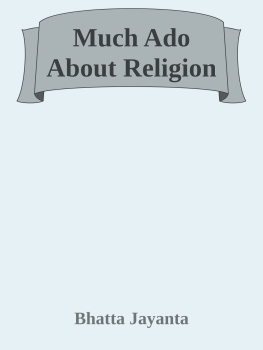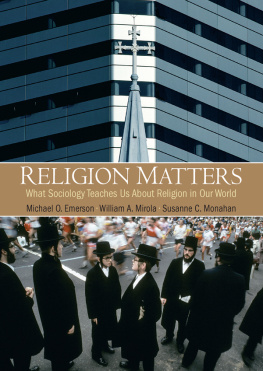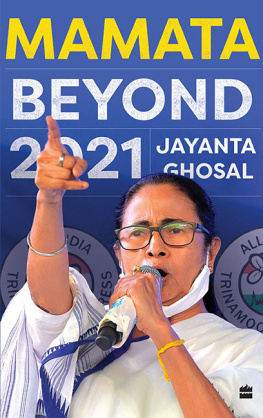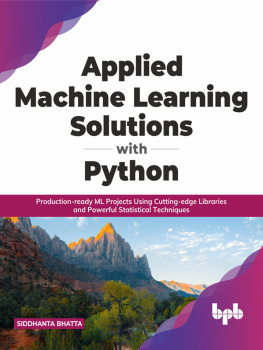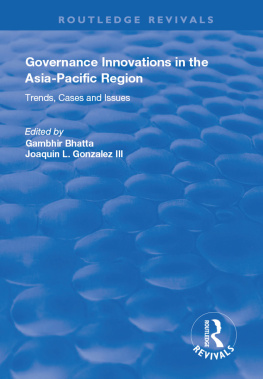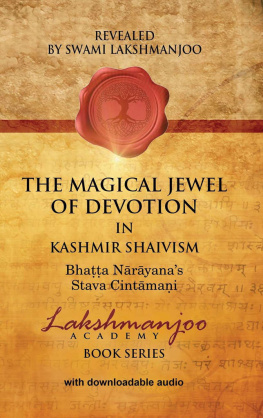Bhatta Jayanta - Much Ado About Religion
Here you can read online Bhatta Jayanta - Much Ado About Religion full text of the book (entire story) in english for free. Download pdf and epub, get meaning, cover and reviews about this ebook. year: 0, genre: Religion. Description of the work, (preface) as well as reviews are available. Best literature library LitArk.com created for fans of good reading and offers a wide selection of genres:
Romance novel
Science fiction
Adventure
Detective
Science
History
Home and family
Prose
Art
Politics
Computer
Non-fiction
Religion
Business
Children
Humor
Choose a favorite category and find really read worthwhile books. Enjoy immersion in the world of imagination, feel the emotions of the characters or learn something new for yourself, make an fascinating discovery.
- Book:Much Ado About Religion
- Author:
- Genre:
- Year:0
- Rating:5 / 5
- Favourites:Add to favourites
- Your mark:
- 100
- 1
- 2
- 3
- 4
- 5
Much Ado About Religion: summary, description and annotation
We offer to read an annotation, description, summary or preface (depends on what the author of the book "Much Ado About Religion" wrote himself). If you haven't found the necessary information about the book — write in the comments, we will try to find it.
Much Ado About Religion — read online for free the complete book (whole text) full work
Below is the text of the book, divided by pages. System saving the place of the last page read, allows you to conveniently read the book "Much Ado About Religion" online for free, without having to search again every time where you left off. Put a bookmark, and you can go to the page where you finished reading at any time.
Font size:
Interval:
Bookmark:
May Brahman, the gradual destroyer of beginningless ignorance, in which intense, fresh joy coruscates, and at the very start of whose descent to the level of consciousness desires for the enjoyment of other pleasing objects cease, shine forth for you.
At the end of the benediction the director says: Shame, for shame! An actors is truly an extremely vile livelihood, a ceaseless tumult of utter deception. Shiva, Vishnu, Brahma, a sage, a king, a brutish fool, a rake, a coward, a hero, a happy man, a sad one: the actor assumes all roles, feeling no shame before the peoplein reality he is just resorting to craft to fill his belly. Better, then, that I should wind up this vile craft, which bears small fruit but causes great trouble and yet more shame, attach myself to the household of a guru in some ashram, and strive to reach the highest goal of man: the cessation of all sufferings. (reflecting) So to whom should I consign this wretched burden of my family, a mere object of pity, before I leave? (looking ahead) Well, let me first find out what he thinks.
Enters the assistant, looks at the director, and says: Why does his face seem haggard with disillusion today? Ill ask him. (approaching) Sir, why so sorrowful a face? Surely you havent been engaged by the pupils of that Writer of the Commentary for some task?
The director repeats what he said above up to sufferings.
assistant: Dont be disillusioned, theres no need. Who among gods, humans or animals has ever escaped from deceit and then reached the supreme goal? This whole multitude of creatures, from god Brahma down to the animals, revolves in worldly existence through illusion alone. Is your lot any worse?
Our conduct cannot be different from that of the whole world that is fooled by illusion: ultimately unreal.
director: My friend, as you say. But even though our conduct is no worse than theirs, still I find it impossible to carry on with it.
assistant: Why, sir?
director: My friend, have I not exerted myself in the staging of the ten dramatic styles as taught by sage Bhrata? Yet now comes the honorable Bhatta Jaynta, also well known as the Writer of the Commentary because he wrote an exegetical work on grammar when he was just a child. His circle of pupils has ordered me to put on a new work of their teacher, an extraordinary play called Much Ado About Religion. So how shall I stage it, since it is neither worldly nor does it follow the dramatic rules, and has never before been performed? Therefore it is better for me just to give up this wretched livelihood.
assistant: Sir, say not so. Surely there is no point putting up a fight against the commands of these honorable pupils of the Writer of the Commentary. As for your worry that it does not follow the rules, is this the fault of the director?
This poet composes a poem paying no heed to the teachings of Bhrata, and despite this his pupils propagate it, and whats more they are also your audience. So just put it on. Why would someone else, a bystander, bother to find fault with it?
director: Im not bothered about peoples abuse.
assistant: So are you afraid of some threat from the king?
director: (smiling) Its not that, either.
assistant: Then why procrastinate? Assign the actors their various partsthe Buddhist, the Jain and so forth.
director: My friend, I simply cannot carry on with this intolerable thespian career, so full of trickery and illusion.
Let the poem flout the rules or obey them, let people be angry or pleasedas for me, I am weary of itall: I shall quit my career now and make pilgrimage to the sacred places. As for you, either please support my indigent family or follow me.
I myself am eager to know the truth. I will enter this great monastery nearby, where hundreds of monks, who have transcended passion, live, and which shows the path to final release.
(Then enter the Buddhist monk, seated on a stool and dressed in a red robe, and his lay disciple in front of him.)
monk: (with dispassion) In this beginningless existence this is the way things are, alas: deluded creatures are born and then die, and dying they are born again. A wise man, seeing that this is the path of sorrow, should direct his thoughts toward the state in which birth anddeath come to a close.
disciple: O Reverend, what is this place which is outside the transactions of birth and death? And by what means is it reached?
monk: My intelligent friend, if you are eager to learn, then strive to comprehend now the Four Noble Truths.
disciple: O Reverend, what are those Four Noble Truths?
monk: My intelligent friend, Suffering, the Cause of Suffering, the Cessation of Suffering, and the Path: these are the Four Noble Truths.
disciple: O Reverend, that much isnt enough to enlighten me. Please teach me the details.
monk: Sir, Ill make you understand.
Pro primo, everything is Suffering, personally experienced as contrary to happiness. That from which it arises is the Cause, the power of delusion. Cessation is Nirvana, the end of all afflictions. The Path is taught by the right-thinking to be the means to attain Nirvana.
disciple: O Reverend, by what means does the Self leave behind these deep waters of suffering, which have been flowing continuously for a long time and are difficult to cross, to then settle in Nirvana?
monk: Good fellow, you dont really get it. In fact, there is no such thing as a Self to escape the straits of suffering and arrive at Nirvana. Surely, This alone is the firm pillar propping up the jailhouse of existence, where cruel torment is suffered ones obsession with a permanent Self.*To explain: A creature who believes this is me will inevitably be convinced that this is mine; and, thinking in terms of me and mine, the dull-minded will surely not give up his harmful desires. For someone whose craving has not ceased, the cultivation of dispassion is remote; and how could one cross over the ocean of existence without cultivating dispassion?
disciple: O Reverend, if there is in fact no permanent self, then who experiences the suffering of existence? Or who rises out of it and arrives at the house of Nirvana?
monk: (smiling) My child, cessation, Nirvana, final beatitude or completion would be all the more impossible if there were a permanent self. For what is permanent cannot possibly cease. Therefore this world is just consciousness contaminated by the various forms of joy, sorrow,etc., having a broad variety of aspects in accordance with the various latent impressions that have been operating in a beginningless continuum. When this path of the cultivation of there being no self, etc., has grounded this in pure consciousness alone, having removed its many kinds of defilements caused by the mass of various adventitious properties, then let it remain in a stream, orlet the stream itself be cut off: this is indeed the fast track to Nirvana.
disciple: O Reverend, if there is no permanent self, who enjoys the fruit of his actions in the next world? And in the present, too, whose are these activities which arememory-based?
monk: Ill skillfully make you understand. Permanent entities cannot have causal efficacy either gradually or instantaneously; and since they cannot have efficacy, they are not ultimately real.For so say the wise: Only that which has causal efficacy can be ultimately real. Furthermore:This pot, whether perishable by nature or not, cannot be destroyed by a hammer or other cause.Such a cause would be either useless or incapable; or because this cause might not occur for an aeon,the pot might not perish. Therefore entities perish as soon as they come into existence, but they appear real because they are in the same continuum. Also, because they exist in a continuum, it is easy to account for the fabrication of effects, such as a stable agent who is also the enjoyer of the fruits of the deeds of that agent, and memory, etc.
Font size:
Interval:
Bookmark:
Similar books «Much Ado About Religion»
Look at similar books to Much Ado About Religion. We have selected literature similar in name and meaning in the hope of providing readers with more options to find new, interesting, not yet read works.
Discussion, reviews of the book Much Ado About Religion and just readers' own opinions. Leave your comments, write what you think about the work, its meaning or the main characters. Specify what exactly you liked and what you didn't like, and why you think so.

